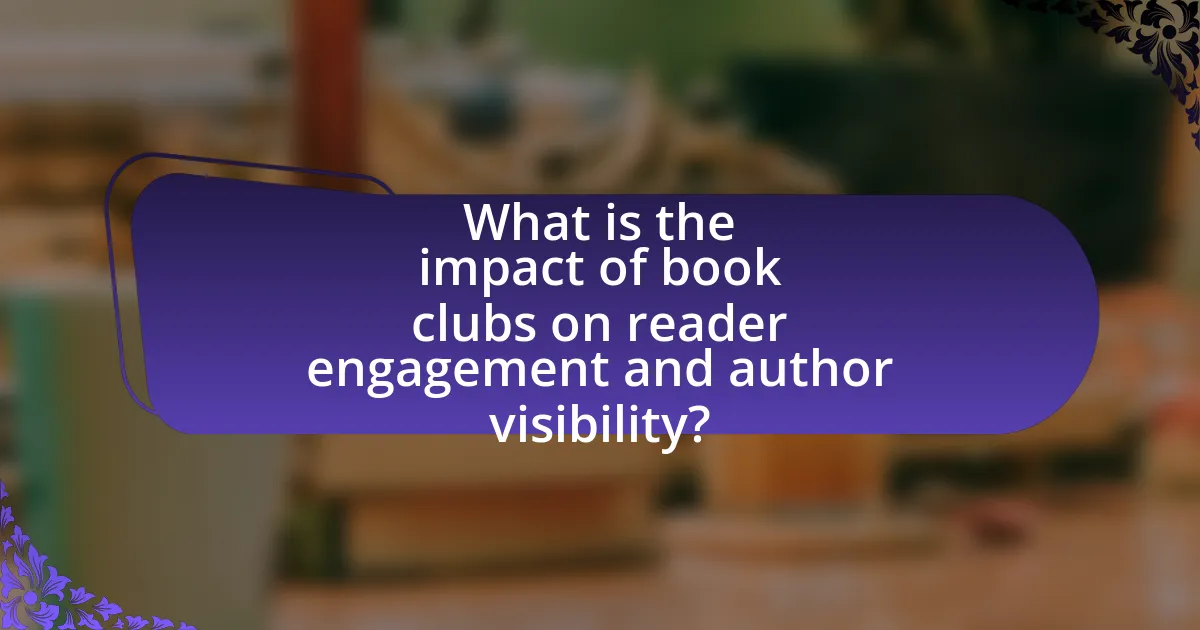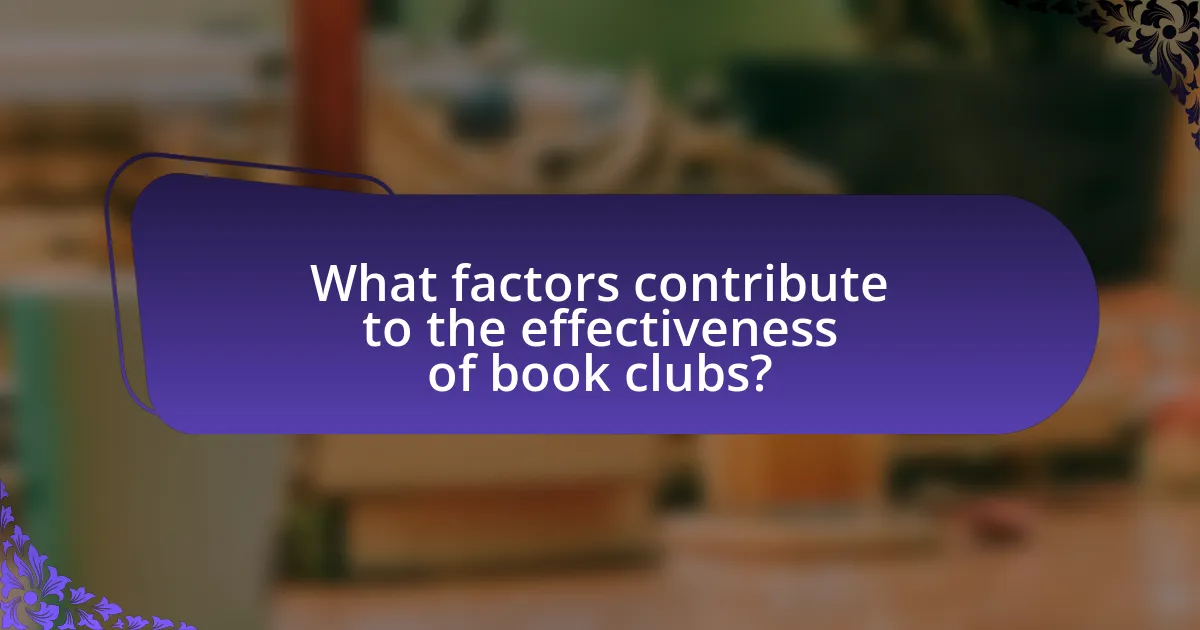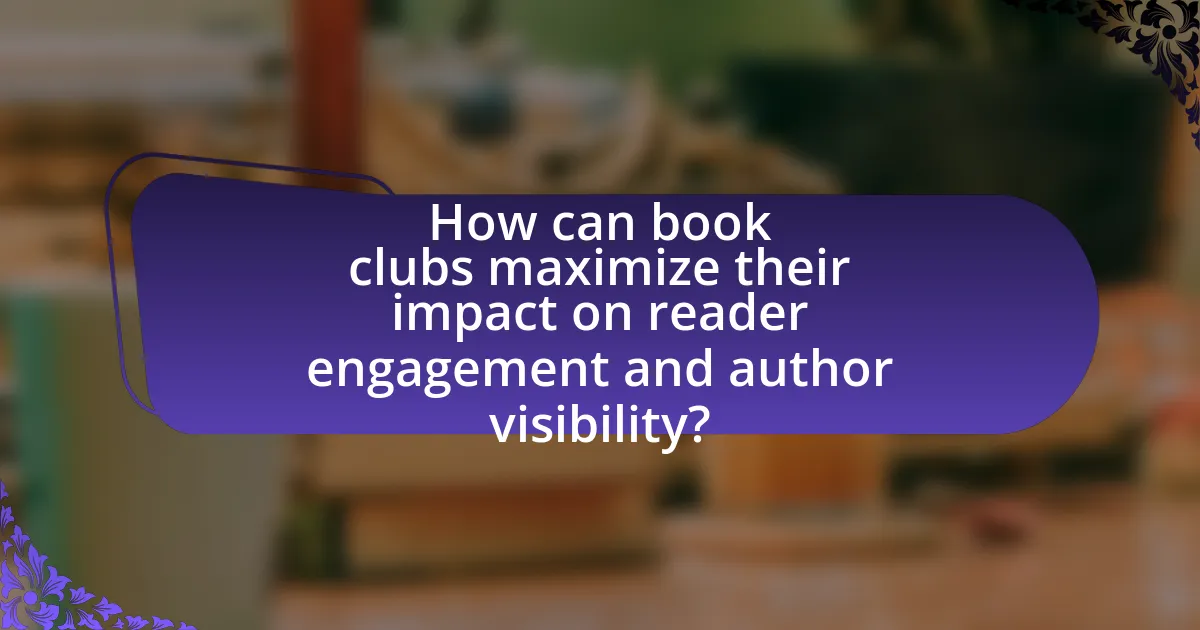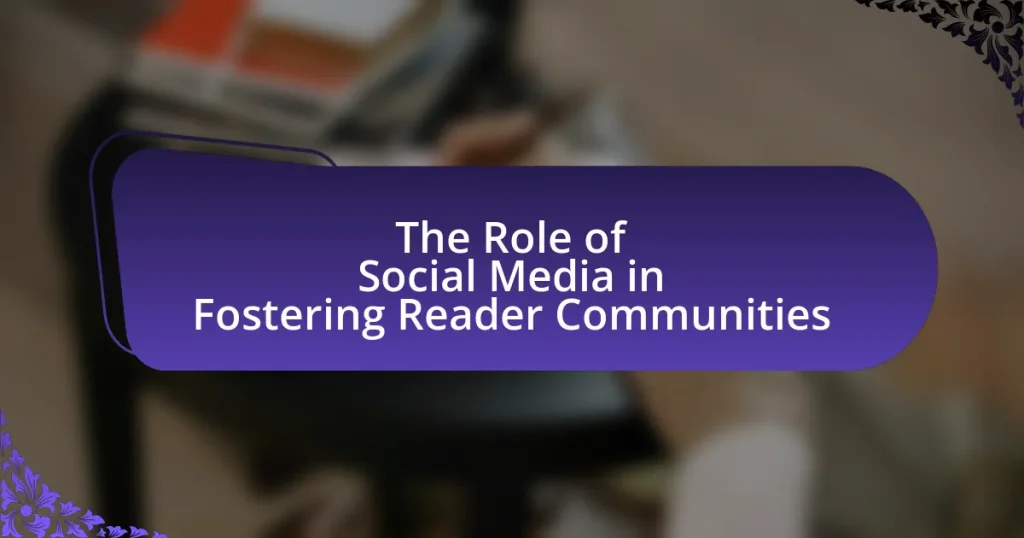The article examines the impact of book clubs on reader engagement and author visibility, highlighting how these groups foster community discussions that enhance comprehension and retention of reading material. It details the activities within book clubs that promote active reading, such as structured discussions and themed challenges, and emphasizes the role of word-of-mouth promotion in increasing authors’ exposure and book sales. Additionally, the article explores factors contributing to the effectiveness of book clubs, including group dynamics, member diversity, and the selection of diverse reading lists, ultimately demonstrating how book clubs can maximize their influence on both readers and authors.

What is the impact of book clubs on reader engagement and author visibility?
Book clubs significantly enhance reader engagement and author visibility. They create a community where readers discuss and analyze books, leading to deeper connections with the material and increased motivation to read. According to a study published in the Journal of Research in Reading, participants in book clubs reported higher levels of enjoyment and comprehension compared to solitary reading. Additionally, book clubs often spotlight authors, providing them with a platform for visibility through discussions, recommendations, and social media sharing. This exposure can lead to increased book sales and a broader audience reach, as evidenced by the rise in popularity of titles featured in book club selections, such as those chosen by Oprah’s Book Club, which often see a significant boost in sales following their announcement.
How do book clubs enhance reader engagement?
Book clubs enhance reader engagement by fostering a sense of community and encouraging discussion around books. This communal aspect motivates individuals to read more actively, as they anticipate sharing insights and opinions with others. Research indicates that participants in book clubs often report higher levels of comprehension and retention of the material, as discussions prompt deeper analysis and diverse perspectives. For instance, a study published in the Journal of Educational Psychology found that group discussions significantly improved participants’ understanding of complex texts, demonstrating the effectiveness of collaborative reading experiences in enhancing engagement.
What activities within book clubs promote active reading?
Activities within book clubs that promote active reading include structured discussions, themed reading challenges, and interactive activities such as role-playing or dramatizations. Structured discussions encourage participants to analyze themes, characters, and plot developments, fostering deeper comprehension and critical thinking. Themed reading challenges motivate members to explore diverse genres or authors, enhancing their reading experience and broadening their literary horizons. Interactive activities, such as dramatizations, allow members to engage with the text creatively, reinforcing their understanding and retention of the material. These activities collectively enhance reader engagement and contribute to a more enriching book club experience.
How does discussion in book clubs influence comprehension and retention?
Discussion in book clubs significantly enhances comprehension and retention of reading material. Engaging in conversations about a book allows participants to articulate their thoughts, clarify misunderstandings, and explore different perspectives, which deepens their understanding of the text. Research indicates that collaborative dialogue promotes critical thinking and helps solidify memory retention; for instance, a study published in the Journal of Educational Psychology found that students who participated in group discussions demonstrated improved recall and comprehension compared to those who read independently. This collaborative learning environment fosters a richer engagement with the material, ultimately leading to better retention of key themes and concepts.
Why are book clubs important for author visibility?
Book clubs are important for author visibility because they create a platform for readers to discuss and promote an author’s work. When members of a book club engage in conversations about a specific book, they often share their thoughts and recommendations with their social circles, thereby increasing the author’s exposure. Research indicates that word-of-mouth marketing, which is prevalent in book clubs, can significantly influence book sales and readership; for instance, a study by the Book Industry Study Group found that 70% of readers are influenced by recommendations from friends and family. This dynamic not only enhances the author’s visibility but also fosters a community around their work, leading to sustained interest and potential future sales.
How do book clubs facilitate word-of-mouth promotion for authors?
Book clubs facilitate word-of-mouth promotion for authors by creating a community where readers discuss and share their thoughts on books. This communal engagement leads to increased visibility for authors as members recommend titles to friends and family, effectively expanding the audience. Research indicates that 70% of readers are influenced by recommendations from friends or book clubs, highlighting the significant role these groups play in promoting authors. Additionally, book clubs often host author events or discussions, further enhancing direct interaction between readers and writers, which can lead to increased sales and a loyal readership.
What role do book clubs play in introducing new authors to readers?
Book clubs play a significant role in introducing new authors to readers by providing a platform for discussion and exploration of diverse literary works. They often select books from emerging or lesser-known authors, which helps to elevate these writers’ visibility among a community of readers. Research indicates that book clubs can increase the likelihood of a book being purchased and read, as members often share their recommendations and insights, creating a ripple effect that encourages others to explore new authors. For instance, a study published in the Journal of Consumer Research found that social interactions within book clubs can enhance readers’ engagement with unfamiliar authors, leading to increased interest and sales.

What factors contribute to the effectiveness of book clubs?
The effectiveness of book clubs is primarily influenced by group dynamics, member engagement, and structured discussions. Group dynamics foster a sense of community and accountability, encouraging members to participate actively. Research indicates that social interaction enhances comprehension and retention of material, as seen in studies like those by the National Reading Panel, which highlight the benefits of collaborative learning environments. Member engagement, characterized by diverse perspectives and shared experiences, enriches discussions and deepens understanding of the text. Structured discussions, guided by thoughtful questions and themes, help maintain focus and stimulate critical thinking, leading to more meaningful conversations. These factors collectively enhance the overall experience and effectiveness of book clubs, promoting greater reader engagement and visibility for authors.
How does the selection of books impact reader engagement in book clubs?
The selection of books significantly impacts reader engagement in book clubs by influencing members’ interest and participation levels. When book clubs choose titles that resonate with their members’ preferences, engagement increases, as evidenced by a study published in the Journal of Research in Reading, which found that book clubs with diverse and appealing selections reported higher discussion frequency and member satisfaction. Conversely, selecting books that do not align with members’ interests can lead to disengagement and lower participation rates. Thus, the careful curation of book selections is crucial for fostering an engaging and interactive book club environment.
What criteria do book clubs use to choose their reading lists?
Book clubs typically use criteria such as member interests, thematic relevance, and literary merit to choose their reading lists. Member interests ensure that selections resonate with participants, while thematic relevance allows for discussions around specific topics or genres, enhancing engagement. Literary merit often involves considering award-winning books or critically acclaimed works, which can elevate the reading experience and provide a basis for meaningful dialogue. These criteria collectively foster a sense of community and encourage diverse perspectives, ultimately impacting reader engagement and author visibility.
How does genre influence participation and discussion in book clubs?
Genre significantly influences participation and discussion in book clubs by shaping members’ interests and engagement levels. For instance, genres like mystery or thriller often stimulate more active discussions due to their suspenseful nature, prompting members to share theories and predictions. Conversely, genres such as literary fiction may lead to deeper, more reflective conversations about themes and character development. Research indicates that book clubs focusing on popular genres tend to attract a wider audience, as seen in a study by the Pew Research Center, which found that 43% of adults read fiction, highlighting its appeal. This genre-based engagement fosters a sense of community and encourages diverse perspectives, ultimately enhancing the overall book club experience.
What social dynamics affect the success of book clubs?
The success of book clubs is significantly influenced by social dynamics such as group cohesion, communication styles, and member diversity. Group cohesion fosters a sense of belonging and commitment among members, which enhances participation and engagement. Effective communication styles, including active listening and respectful dialogue, facilitate deeper discussions and connections among participants. Additionally, diversity in member backgrounds and perspectives enriches conversations, leading to a broader understanding of the material and increased enjoyment. Research indicates that book clubs with high levels of social interaction and varied viewpoints tend to have higher retention rates and member satisfaction, reinforcing the importance of these social dynamics in achieving success.
How do group size and member diversity influence discussions?
Group size and member diversity significantly influence discussions by affecting the range of perspectives and the dynamics of interaction. Larger groups tend to generate a wider variety of viewpoints, which can enhance creativity and problem-solving but may also lead to challenges in managing conversation flow and ensuring equal participation. Conversely, smaller groups often facilitate deeper discussions and stronger connections among members, allowing for more focused dialogue.
Member diversity, including differences in background, experiences, and opinions, enriches discussions by introducing unique insights and fostering critical thinking. Research indicates that diverse groups are more likely to produce innovative solutions and engage in constructive debates, as evidenced by studies showing that teams with varied demographics outperform homogenous ones in decision-making tasks. Thus, both group size and member diversity play crucial roles in shaping the quality and effectiveness of discussions within book clubs, ultimately impacting reader engagement and author visibility.
What are the benefits of having a structured format in book club meetings?
Having a structured format in book club meetings enhances engagement and facilitates meaningful discussions. A clear agenda allows participants to prepare in advance, ensuring that everyone can contribute effectively. This structure promotes a balanced conversation, preventing dominant voices from overshadowing quieter members, which is crucial for fostering inclusivity. Research indicates that structured discussions lead to higher satisfaction rates among participants, as they feel their opinions are valued and heard. Additionally, a defined format can help in tracking themes and insights over time, enriching the overall reading experience and deepening connections with the material and each other.

How can book clubs maximize their impact on reader engagement and author visibility?
Book clubs can maximize their impact on reader engagement and author visibility by fostering interactive discussions and promoting diverse reading selections. Interactive discussions encourage members to share personal insights and interpretations, which deepens engagement and creates a sense of community. Research indicates that social interaction enhances reading comprehension and enjoyment, as seen in studies by the National Endowment for the Arts, which found that group discussions can significantly increase readers’ connection to the material. Additionally, selecting a variety of genres and authors, including underrepresented voices, broadens the appeal of the club and introduces members to new perspectives, thereby increasing visibility for those authors. This approach not only enriches the reading experience but also supports authors by generating word-of-mouth promotion and potential sales through club recommendations.
What strategies can book clubs implement to enhance member participation?
Book clubs can enhance member participation by implementing strategies such as creating a structured schedule, incorporating diverse book selections, and fostering an inclusive environment. A structured schedule, including regular meetings and clear agendas, helps members anticipate discussions and prepare accordingly, which can increase attendance. Diverse book selections cater to varying interests and encourage broader participation, as members are more likely to engage with books that resonate with them. Additionally, fostering an inclusive environment, where all opinions are valued and discussions are respectful, promotes a sense of belonging and encourages members to share their thoughts openly. Research indicates that clubs with these strategies report higher engagement levels, as members feel more connected and invested in the group dynamics.
How can technology be utilized to engage members in virtual book clubs?
Technology can be utilized to engage members in virtual book clubs by leveraging platforms that facilitate real-time discussions, multimedia sharing, and interactive features. For instance, video conferencing tools like Zoom or Microsoft Teams allow members to meet face-to-face, enhancing personal connections and discussions about the book. Additionally, social media platforms such as Facebook or Goodreads can be used to create dedicated groups where members can share insights, post questions, and engage in asynchronous conversations, fostering a sense of community. Furthermore, using collaborative tools like Google Docs enables members to annotate texts together, providing a shared reading experience. Research indicates that virtual interactions can increase participation rates by 30% compared to traditional book clubs, highlighting the effectiveness of technology in enhancing engagement.
What are effective ways to encourage diverse reading selections in book clubs?
Effective ways to encourage diverse reading selections in book clubs include implementing structured reading lists that feature authors from various backgrounds, genres, and cultures. By curating these lists, book clubs can ensure representation and expose members to different perspectives. Additionally, facilitating discussions around the importance of diversity in literature can enhance awareness and appreciation among members. Research indicates that diverse reading experiences can improve empathy and understanding, as highlighted in a study by the National Endowment for the Arts, which found that exposure to diverse narratives fosters greater cultural awareness.
What best practices should book clubs follow to promote authors effectively?
Book clubs should actively engage in author promotion by organizing author events, utilizing social media, and fostering discussions around the author’s work. Organizing author events, such as virtual or in-person Q&A sessions, allows readers to connect directly with authors, enhancing visibility and engagement. Utilizing social media platforms to share reviews, quotes, and discussions about the author’s work can reach a broader audience, as studies show that social media can significantly increase book sales and author recognition. Fostering discussions around the author’s themes and writing style encourages deeper engagement, which can lead to increased interest in the author’s other works. These practices collectively enhance the visibility of authors and create a more engaged reading community.
How can book clubs collaborate with authors for events and discussions?
Book clubs can collaborate with authors for events and discussions by organizing virtual or in-person meetings where authors can participate in Q&A sessions, share insights about their work, and engage directly with readers. This collaboration enhances reader engagement by providing a platform for deeper discussions about the book’s themes, characters, and writing process, which can lead to increased visibility for the author. For instance, many authors have successfully participated in book club events, resulting in heightened interest in their books and fostering a community around their work.
What methods can book clubs use to share their experiences with a wider audience?
Book clubs can share their experiences with a wider audience through social media platforms, blogs, and podcasts. Utilizing social media allows book clubs to post reviews, discussion highlights, and member insights, reaching a broader audience quickly; for instance, platforms like Instagram and Facebook enable visual storytelling and community engagement. Blogs provide a space for in-depth reviews and reflections on books read, which can attract readers searching for recommendations or insights. Additionally, podcasts allow book clubs to discuss their reading experiences in a conversational format, appealing to auditory learners and expanding their reach. These methods not only enhance reader engagement but also increase visibility for authors, as book clubs often highlight specific works and share their thoughts with a larger community.



